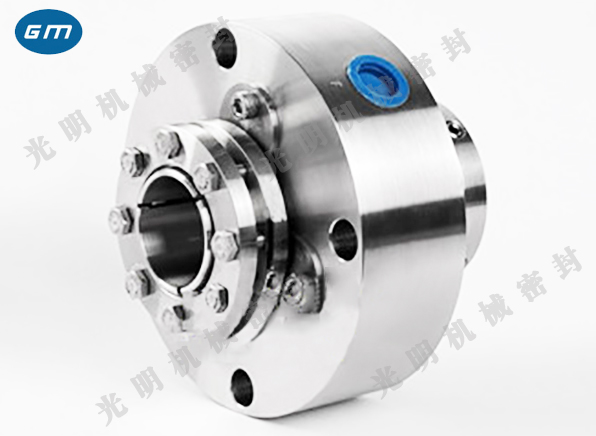The face morphology of mechanical seal has a significant impact on the seal performance and life. The main characteristics of the surface morphology of the actual seal ring are that the local part has randomness, while the overall part has statistical laws, which are generally characterized by rental accuracy and correlation length. In this paper, based on the theory of stochastic process and time series, the topography of mechanical seal face is simulated. On this basis, the Reynolds equation in polar coordinates is solved by using the finite difference method, and the lubrication state of the face is numerically corrected. The simulation results can reflect the change rule of the actual end face parameters, indicating that the simulation of the random process with the F end face morphology is feasible, which provides an idea for the establishment of a more accurate mathematical model of mechanical seals

preface
When the materials of dynamic ring and static ring of mechanical seal are determined, the sealing performance has a direct relationship with the end face morphology. The thickness and pressure distribution of the steady-state liquid film will also change with different end face shapes. The macroscopic performance is different leakage rates and friction torques, which directly affect the performance and service life of mechanical seals 1.2]. Therefore, it is necessary to fit the end surface morphology through mathematical or experimental methods, and then analyze the actual end surface stability.
Although the face morphology of mechanical seal shows randomness locally, the existing research shows that the height and length of rough surface profile have statistical laws in the axial and radial direction of the face, and the research in this direction is gradually deepening. From Heinze's ideal parallel end face model to Mayer's parallel rough end face model, the mathematical representation of end face morphology gradually deepened and tended to the real situation. In addition to the traditional height standard deviation, new mathematical expressions such as Gaussian process and fractal theory are also applied to mechanical seals. Compared with other methods, the surface topography obtained by Sun Jianjun and others based on fractal theory can reflect the geometric self similarity and self radioactivity of the actual end face topography 3]. With the development of observation methods for micro surface, more accurate models can also be obtained by observing the real micro morphology of the moving and stationary rings through experiments and analyzing them using statistical methods. The change of microscopic morphology is one of the basis for the analysis of face seal performance degradation -. Using the results of off-line measurement of experiments to verify the correctness of the mathematical degradation model has become an important means of studying mechanical seals
Combined with the above analysis, based on the existing research, this paper takes the mechanical seal for airborne pump as the research object, and uses the random process and time series to fit the three-dimensional model of the end face. On this basis, this paper uses the finite difference equation to solve the Reynolds equation in polar coordinates, and then carries out numerical simulation of the fluid lubrication state of the seal face.

2 Mechanical seal structure, i.e. parameter setting
The research object of this paper is shown in Figure 1. The seal structure mainly consists of five parts, namely leather cup, retainer ring, spring, static ring and dynamic ring. The cup and retainer ring limit the circumferential movement of the spring to ensure that the spring is always parallel to the axis. The structure of static ring compensation can avoid
Fasteners (such as springs) rotate with the shaft, further reducing the shape of the seal.
3 Surface topography fitting
The height distribution of actual seal face asperities generally meets the requirements of high With a height of 0~1 μ M random distribution, overall trend Stokes model, whose surface profile shows exponential autocorrelation function The potential is relatively moderate. The fitting result is in line with the actual end face morphology, which is basically special
It provides a basis for solving lubrication parameters in the following text. The theoretical model of mechanical process provides computer simulation of rough surface topography
4 Reynolds equation solution and oil film parameter equation It is possible. And then surface morphology (such as lubrication, friction and wear) The numerical analysis of provides data. Based on this theory, this paper adopts Numerical methods for solving Reynolds equation include finite difference method . A rough topography simulation method based on random process and time series, Finite volume method, boundary element method and finite element method, etc. Wherein, finite difference
This method can randomly simulate the random roughness of any autocorrelation function






